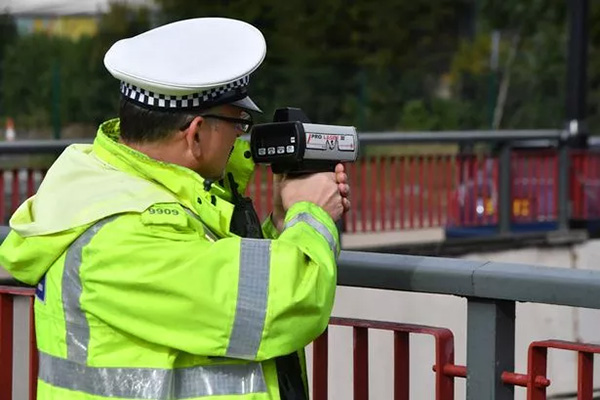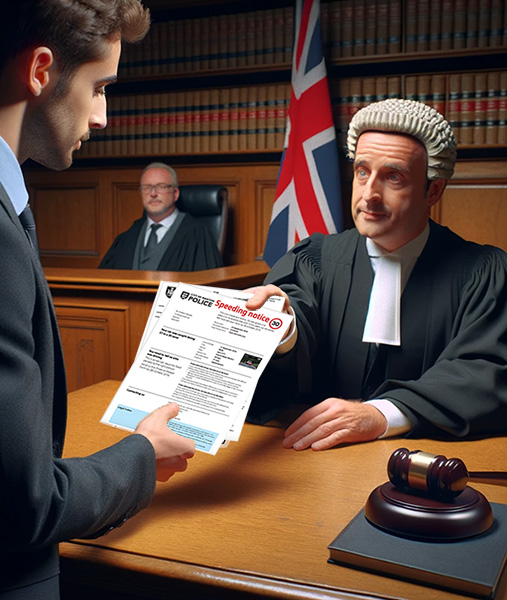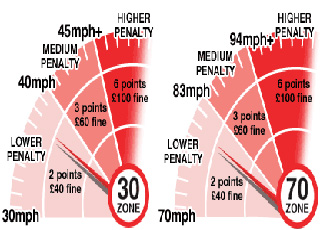Every year, hundreds of thousands of drivers receive penalty notices for speeding in the UK. If you find yourself facing a fine due to a speed camera incident, it’s crucial to understand your legal rights and potential avenues for disputing the penalty. Receiving a Notice of Intending Prosecution (NIP) could lead to three penalty points or even a driving disqualification.
Our comprehensive guide will take you through the entire process, from the cost of speeding fines to the range of penalties for different road offences.
How Speeding Fines Operate in the UK
Exceeding the speed limit in the UK is a serious offence with consequences not only for the offending driver but also for fellow road users. The UK employs stringent regulations enforced by law enforcement officers and speed cameras to maintain road safety.
 When caught driving at excessive speeds, the legal process begins with the issuance of a Section 172 notice and a Notice of Intended Prosecution (NIP). These notices serve as official warnings of impending legal action. Ignoring them could escalate the situation, potentially leading to a court appearance.
When caught driving at excessive speeds, the legal process begins with the issuance of a Section 172 notice and a Notice of Intended Prosecution (NIP). These notices serve as official warnings of impending legal action. Ignoring them could escalate the situation, potentially leading to a court appearance.
Upon receiving the Section 172 notice and identifying the driver, authorities proceed to issue either a Fixed Penalty Notice (FPN) or a court summons. The FPN offers drivers a choice: admit guilt and pay the fine or contest the allegation in court by pleading not guilty.
Opting for the Fixed Penalty Notice entails acknowledging responsibility for the offence and settling the prescribed fine. However, if the driver disputes the allegation, they have the right to contest it in a court of law. This option allows individuals to present their case, providing evidence or arguments to challenge the accusation.
Checking for Speeding Offences
Confirming whether you’ve been caught speeding poses a significant challenge unless you’ve been pulled over by law enforcement at the roadside. The definitive method of confirmation entails patiently awaiting the arrival of a notice of intended prosecution (NIP) via postal mail.
Digital speed cameras, unlike their traditional counterparts, don’t emit a flash to signal a speeding violation. This lack of visual indication complicates the process of self-verification. Despite the absence of a flash, fines or NIPs typically arrive within a timeframe of 14 days following the incident. However, delays may occur, particularly if the vehicle in question isn’t registered to your current address.
These delays may extend the period of uncertainty, leaving individuals awaiting confirmation of their potential offence. In cases where vehicles are registered to alternative addresses or involve rental or company vehicles, the process of forwarding notices adds another layer of complexity.
Given the reliance on postal delivery for official notifications, individuals must exercise patience during this waiting period. The uncertainty surrounding whether a speeding offence has been captured by automated enforcement systems can be a source of anxiety for motorists. Nevertheless, adhering to traffic laws and speed limits remains paramount to avoid potential legal consequences.
Penalties for Speeding
Speeding offences typically incur minor penalties, with the most common consequence being a Fixed Penalty Notice (FPN) totaling £100 and three points on your driver’s licence. However, drivers have the option to attend a speed awareness course instead of receiving penalty points, provided they meet the eligibility criteria.
For more serious violations, penalties can become more severe. This could entail higher fines, an increased number of penalty points on your licence, or even a temporary driving disqualification. The severity of the punishment often depends on the discretion of law enforcement officers.
In cases where the offence is deemed particularly egregious or the driver has a history of speeding violations, the matter may escalate to court proceedings. Police officers may choose to pursue prosecution, especially if the driver has repeatedly exceeded the speed limit or committed other traffic offences.
Ultimately, the consequences of a speeding offence can vary depending on the circumstances and the decision of law enforcement. It’s essential for drivers to adhere to speed limits and exercise caution on the roads to avoid potential legal repercussions.
Legal Thresholds and Fines
The fines imposed for speeding offences are determined by the extent of the violation. For example, exceeding the speed limit by driving at 40mph in a 30mph zone falls within the parameters of Band A rules. This infraction typically warrants a fine of £288 along with the addition of three penalty points to your driver’s licence.
However, as the speed exceeds the limit by a greater margin, the penalties become more severe. Driving at higher speeds, such as 45mph or 51mph in a 30mph zone, could lead to increased fines and a higher number of penalty points on your licence. The severity of the punishment escalates in proportion to the seriousness of the violation.
It’s important for drivers to be aware of the legal thresholds for speeding offences and to adhere to the designated speed limits to avoid facing fines and penalties. By obeying traffic laws and exercising caution while driving, motorists can contribute to safer road conditions for themselves and others.
Dispelling Common Misconceptions
While the law mandates adherence to speed limits, misconceptions about allowable thresholds persist. The ‘10% plus 2′ guideline recommended by the National Police Chiefs’ Council aids officer discretion but isn’t legally binding.
Speeding repercussions extend beyond mere fines, potentially leading to court appearances or licence disqualification. Leniency is rare, with magistrates imposing bans for significant speed limit breaches.
Disputing Speeding Fines

Challenging a speeding fine requires careful consideration, as baseless appeals may lead to court appearances and heavier penalties. Valid dispute grounds include technicalities or proof of innocence, such as incorrect documentation or unclear road signs.
Submitting a mitigation letter outlining mitigating factors or remorse may influence court decisions. However, excuses like ignorance of speed limits or road conditions typically hold no weight.
Facing the Legal Process
Disputing a speeding fine often involves court proceedings, necessitating thorough preparation and adherence to legal procedures. Whether in person or through written argumentation, presenting a compelling case is essential for favourable outcomes.
Expressing contrition and outlining mitigating factors may sway court decisions, potentially mitigating penalties. However, acceptance of guilt may yield leniency in sentencing.
Ultimately, understanding the inner workings of speeding fines empowers drivers to face legal proceedings effectively and uphold road safety standards.


